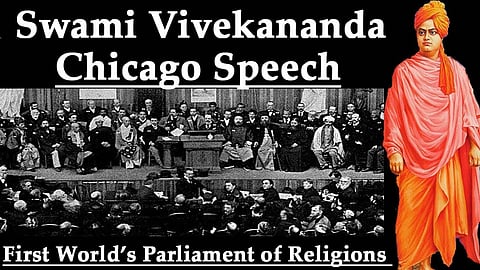

Swami Vivekananda (1863–1902) is best known in the India and the World for his ground-breaking speech to the 1893 World’s Parliament of Religions in Chicago, in which he introduced Hinduism to America and called for religious tolerance and an end to fanaticism. Vivekananda is renowned for his impactful speech that was delivered on September 11, 1893, and is considered one of the most influential addresses in the history of interfaith dialogue. His words introduced Hinduism to the Western world, advocating for religious tolerance, unity, and understanding among all faiths.
Born Narendranath Dutta, he was the chief disciple of the 19th-century Yogi Ramakrishna and the founder of Ramakrishna Mission. Swami Vivekananda is also considered a key figure in the introduction of Vedanta and Yoga to the West and is credited with raising the profile of Hinduism to that of a world religion.
Main ideas covered in the speech
Vivekananda began his speech by addressing the crowd as "Sisters and Brothers of America," striking a chord with the audience right away. He stressed the significance of seeing every individual as a member of a single global community, surpassing religious and cultural differences.
Religious Tolerance: He communicated that no religion holds superiority over another. His speech emphasized that despite varying rituals and expressions, all religions ultimately point towards the same divine truth. Vivekananda advocated for recognizing various spiritual paths and encouraged people to value the different belief systems.
Hinduism's message: Vivekananda portrayed Hinduism as a religion characterized by tolerance, inclusivity, and acceptance. He detailed important Hindu ideas, such as the omnipresence of the divine and the understanding that truth can manifest in various ways. He focused on the traditional Indian principle of "Ekam Sat, Vipra Bahudha Vadanti" (One truth, many wise people speak of it in different ways).
Review of Religious Prejudice: Vivekananda warned about the risks of religious rigidity and factionalism. He condemned the destructive impact of religious extremism, which has often resulted in violence and pain throughout history.
Speech inspiration
The philosophical and spiritual background of Vivekananda was greatly shaped by his teacher, Sri Ramakrishna Paramahamsa, who highlighted that all religions ultimately lead to the same reality. Ramakrishna's exploration and admiration of various religions influenced Vivekananda's view on religious unity.
Vivekananda, as an advocate of Advaita Vedanta, upheld the fundamental unity of all existence. The fundamental concept in Vedanta, that the same divine consciousness exists in all beings, motivated him to discuss the interconnectedness of all religions and individuals.
Vivekananda gained a profound awareness of global issues, such as poverty and the erosion of spiritual beliefs, through his travels in India. His encounters motivated him to share India's abundant spiritual legacy with the world, to raise humanity up with the wisdom of age-old lessons. Vivekananda sought to foster understanding between Eastern and Western ideologies. His goal was to dispel biases in the Western world towards Eastern spirituality, which was frequently misinterpreted or dismissed back then.
Influence of Vivekananda's teachings
Swami Vivekananda speech caused great excitement among the audience and quickly turned him into a sensation in America. It played a role in changing how India and Hinduism were viewed in Western countries. His lessons laid the foundation for the worldwide interfaith movement and for advancing universal acceptance and comprehension among religious and cultural differences.
Vivekananda's speech in Chicago still motivates millions globally, emphasizing the significance of solidarity, acceptance, and reverence for every individual.
